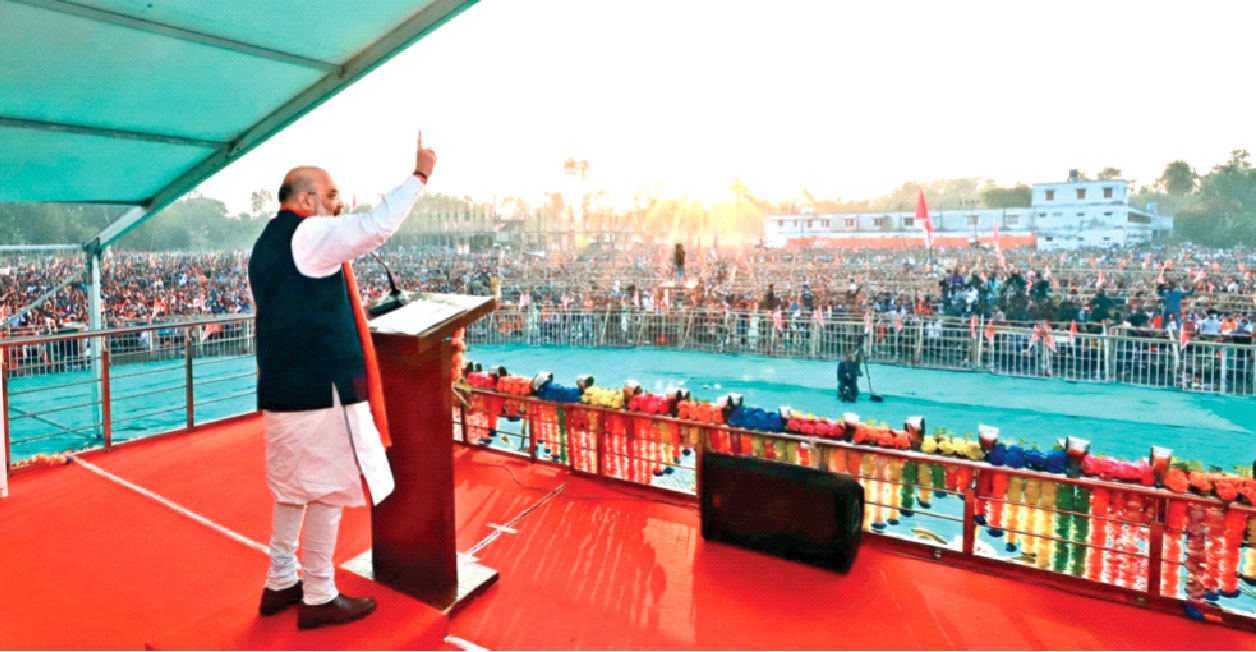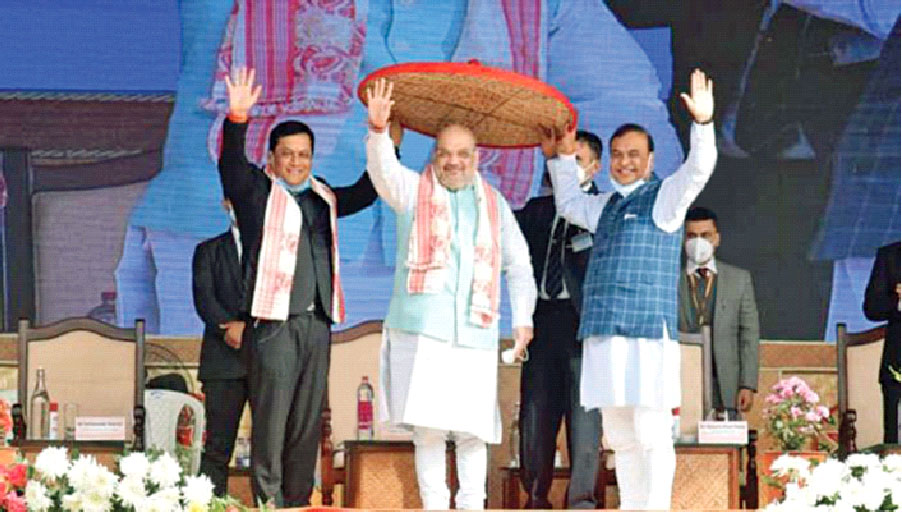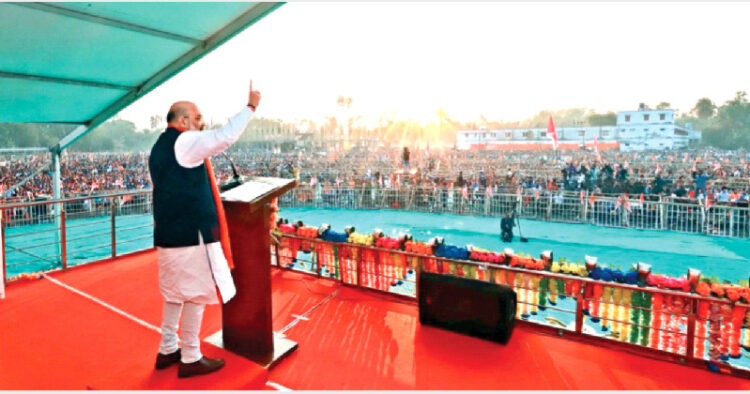BJP is betting big on development; its leaders vouch that only the Saffron party can pull West Bengal from the pit of underdevelopment, corruption, and appeasement politics

Union Home Minister Amit Shah addressing a massive gathering
during BJP’s Poriborton Yatra, in Kakdwip, Bengal, on February 18
during BJP’s Poriborton Yatra, in Kakdwip, Bengal, on February 18
Riding high on hopes of Poriborton, Mamata’s TMC dislodged the well-entrenched Marxists who were ruling the roost in Bengal for more than three decades. Soon after taking over the reins of power, she conveniently dumped her development slogans. Mamata trod the same path the Marxists had traversed: Violence, corruption and administrative ineptitude had pushed all hopes of revival of Bengal down the drain.
With Assembly elections round the corner, BJP is betting big on development and taking her on her appeasement policies. “This is BJP’s fight to make Bengal ‘Sonar Bangla’,” said Union Home Minister Amit Shah, during his visit to the State to launch the final phase of PoribortonYatra. BJP promises that it is the only party that can pull Bengal from the pit of underdevelopment and corruption.
“It is not our aim to bring BJP Government after removing Mamata Banerjee’s government. Our goal is to ensure that there is a change in the situation in West Bengal, a change in the situation of the poor of the state, a change in the situation of women of the state,” he added. The Home Minister also announced that the BJP government will provide more than 33 per cent reservation to the women in Bengal.
To drive home the message that BJP would reclaim Bengal’s lost glory and protect its cultural ethos, Shri Amit Shah visited Gangasagar in South 24 Parganas and Kapil Muni Ashram. “Shouldn’t Durga Puja take place in Bengal? Court permission needs to be obtained for it. Shouldn’t Saraswati Puja take place? She had stopped it, only after BJP’s pressure she was seen worshipping goddess Saraswati. Didi, Bengal knows that you stopped ‘Saraswati Pujan’ in schools.”
Trinamool, a Sinking Ship
The BJP has high hopes in Bengal. The Trinamool Congress has been reduced to a sinking ship as party leaders are deserting it. The latest is Dinesh Trivedi who recently announced his resignation as Trinamool Congress member from Rajya Sabha. “I am feeling claustrophobic as corporate agencies are running my party. There is too much violence in my State,” he lamented.
He said there was nothing wrong with joining BJP and he does not need an ‘invitation’ to join the saffron party—where he had ‘great friends’ in Prime Minister Narendra Modi and also Home Minister Amit Shah.
The Matuas are a socially deprived community, called ‘Namasudras’. They are numbering between 25 and 30 million. It is, therefore, clear that if BJP is keen to wrest power in West Bengal, then its leaders cannot ignore the sentiments of the Matua community
It is a big blow for ‘Didi’ as Trivedi, who hails from Gujarat, had befriended the mercurial Trinamool supremo when she was almost a loner in Parliament especially her party was routed in Lok Sabha polls of 2004.
While his resignation could be called an act driven by sheer opportunism as the poll season is turning much awkward for Trinamool leaders, Dinesh Trivedi seems to be much displeased by Mamata’s decision to enlist the services of poll strategist Prashant Kishor. He said those who did not know ABC of politics were now running Trinamool.
He said, “If you sit here quietly and cannot do anything, then it is better that you resign from here and go to the land of Bengal and be with people”.
The Citizenship Amendment Act (CAA) of 2019 and a move for registration of all citizens, called the National Register of Citizens (NRC) in Assam, will be in public discourse in the two poll-bound states of West Bengal and Assam.
The opposition—Congress, Communists and Trinamool Congress, is interpreting the CAA as the Narendra Modi Government’s alleged failure to ensure protection and equal rights for Muslims. The charges are essentially political and largely revolve around the ‘appeasement’ card of the secular brigade.
According to educationist Manu Saha, the huge community of Matuas spread over several districts in the border areas of West Bengal will be the clinching factor. “Essentially, they are Hindu refugees and if the CAA is implemented, they can influence results in favour of the Bharatiya Janata Party (BJP) in at least 20 seats in the Assembly polls due April-May 2021,” says Saha.

During his visit to Assam as part of his two-day
visit to the North East, Shah launched several development projects
visit to the North East, Shah launched several development projects
Separate state of ‘Gorkhaland’ is a pressing demand in hills pending since the time of Rajiv Gandhi and Subhas Ghising. But Bengalis are extremely touchy about yet another round of ‘partition’ of Bengal
‘Anti-Gorkhaland’ Consolidation
Mamata’s gameplan or political opportunism has backfired in North Bengal, a region where the BJP has established strong grip. According to common people, most of it has turned in favour of the saffron party owing to Mamata’s gamble when she decided to ally with a pro-Gorkhaland outfit. No wonder, Trinamool Congress supremo’s hyped rally at Siliguri on February 1 has turned a flop show as the turnout was very poor.
A shopkeeper Ajay Das says, “The pro-change wave (real Poriborton) in favour of BJP is very strong. A large section of Trinamool foot-soldiers and supporters who came for Didi’s rally could vote against Trinamool on the voting day. How could she ally with a discredited face like Gorkha Janamukti Morcha leader Bimal Gurung”.
Trinamool had won 16 seats out of total 54 Assembly seats in North Bengal five years ago in 2016. But the manner in which the BJP has gained grounds marginalising the Congress and the Left, it is any body’s guess now that the BJP’s tally will go up and Didi may end up with a modest 5-6 seats only from the region.Traditionally some North Bengal parts like Murshidabad and Malda have had a strong Congress presence but the BJP performance in 2019 polls was very encouraging.
Separate state of ‘Gorkhaland’ is a pressing demand in hills pending since the time of Rajiv Gandhi and Subhas Ghising. But Bengalis are extremely touchy about yet another round of ‘partition’ of Bengal.
The voters in the North Bengal region and in and around Siliguri are also unhappy with Mamata for allegedly ‘neglecting’ the region during the last 10 years. Moreover, the violence triggered by Trinamool workers from time to time has upset the common people. Local observers say a large number of former CPI(M) cadres who faced the brunt of Trinamool inspired violence during last decade have shifted allegiance tactically to the BJP camp.
A Healing Touch
The Matuas are a socially deprived community, called ‘Namasudras’. They are numbering between 25 and 30 million. It is therefore clear that, if the BJP is keen to wrest power in West Bengal, then its leaders cannot ignore the sentiments of the Matua community. The party’s lawmaker Shantanu Thakur is also batting for the beleaguered community.
The Bangaon MP has put pressure on the Union government and the BJP leadership, saying that people in his constituency bordering Bangladesh want immediate implementation of the new Citizenship Law. Of course, implementing this law would mean granting citizenship to the Matua Hindu community.
Over the years, members of the Matua community had been migrating to West Bengal from Bangladesh. Therefore, they can now easily attain legal citizenship in India under the CAA.
The government’s critics have been arguing that the law enacted by the Narendra Modi Government in December 2019 is “discriminatory” against Muslims. Ironically, without doing much homework, the Western newspapers have also published articles accusing Prime Minister Narendra Modi of building a Hindu state. The influential US Commission on International Religious Freedom (USCIRF) has cited the new legislation adopted by the Indian Parliament in December 2019 and downgraded India to its lowest category of “countries of particular concern” in terms of freedom to exercise a religious faith.
However, New Delhi has been outright and strongly rejected such contentions. PM Modi himself and other BJP leaders maintain that the aim of the CAA is to ensure that the citizenship is granted to ‘persecuted religious minorities’, including Christians, Jains, Parsis, Buddhists and Hindus coming from three neighbouring countries—Afghanistan, Pakistan and Bangladesh.
Dispelling doubts on the intention of CAA, BJP leader Kailash Vijayvargiya said: “The law is controversial only for political reasons and is being challenged as it makes it easier for non-Muslims from Pakistan, Bangladesh and Afghanistan—all three Muslim-dominated countries—to secure Indian citizenship. It does not hamper or throw a challenge to citizenship of bonafide Indians including Muslims.”
The politics around CAA is interesting and a bit complex. Although the new law has been enacted by the BJP-led Modi government and it is likely to yield electoral dividends to the saffron party in West Bengal; in Assam—there is a sizable section of BJP leaders who are apprehensive that the new law may backfire.
Apprehension in North Eastern States
In the Barak Valley of Assam, the BJP leaders feel the CAA will give it an edge vis-a-vis the Congress and the AIUDF. Both the parties are largely seen as pro-Islamist forces. In large parts of India including in and around New Delhi, where the law is largely being opposed for its ‘anti-Muslim’ slant, in Assam essentially the new law (CAA) is seen as a threat to the culture and identity of the indigenous inhabitants of the State and the rest of North East. Sadly, in Assam five persons died at the peak of the anti-CAA protest on December 12, 2019.
In Assam the politics over the CAA is heating up with strong political ramifications. PabindraDeka, a senior legislator of BJP’s regional partner AsomGanaParishad, resigned from the party because of its backing of the law brought in by the BJP.
Meanwhile, the influential North Eastern Students’ Organisation, a body of tribal students across the seven states, has indicated that the protest is a message to Modi’s party that the North East, which has a substantial Christian presence, will remain opposed to the law. The CAA ought to be scrapped, they say.
“This new law has huge potential to garner Hindu refugees’ votes to the BJP in West Bengal and in the Barak Valley in Assam. There is a paradox as it CAA is also seen as a threat to the identity and culture of tribal Christians and Assamese,” says political observer Ratnadeep Gupta in Guwahati.
Meanwhile, the Trinamool Congress under Mamata Banerjee in West Bengal said the party will never implement the new central law.
During his recent visit to Assam, Home Minister Shri Amit Shah cautioned the people of Assam against the politics of violence and protest.
“Some people will try to mislead the local population by indulging in agitations. Only the youth has been martyred during the agitation. But I want to ask what agitation has given Assam? Has agitation led to creation of jobs or development,” asked Shri Shah.
Mamata to Contest from Nandigram
Pushed to the corner after desertion by ‘son of the soil’ Suvendu Adhikari, TMC supremo Mamata Banerjee on January 18 made the big announcement that she would contest the forthcoming Assembly polls from Nandigram.
“Nandigram is lucky for me…,” she said at a party rally days after Suvendu Adhikari, a former Minister and prominent local face in Nandigram, quit her outfit and joined the resurgent BJP.
Mamata’s announcement is being billed as a ‘game changer’ but the BJP termed her announcement as a move to flee Bhawanipore, the seat she represented earlier
Mamata Banerjee’s announcement is being billed as a ‘game changer’ but the BJP termed her announcement as a move to flee Bhawanipore, the seat she had represented earlier.
“Bhawanipore is my elder sister, Nandigram is also my sister. I will contest from both the constituencies as my movement started from Nandigram itself,” said the Chief Minister, who is facing the onslaught of the BJP that has enhanced its vote share to 40 per cent just three per cent less than Trinamool Congress in 2019.
BJP leader Sovan Chatterjee, also a turncoat from Mamata’a own party, said her move only shows that she has lost ground at Bhawanipore and in Kolkata. “This is the beginning of defeat,” he said.
Of course, Chief Minister’s move will be a direct challenge to SuvenduAdhikari, who has reportedly promised perhaps at least 30 seats from the region to the saffron party’s kitty.
Suvendu’s exit from Trinamool show an exodus of Trinamool leaders to the BJP and the development has certainly left the Trinamool camp leaking its wounds.














Comments